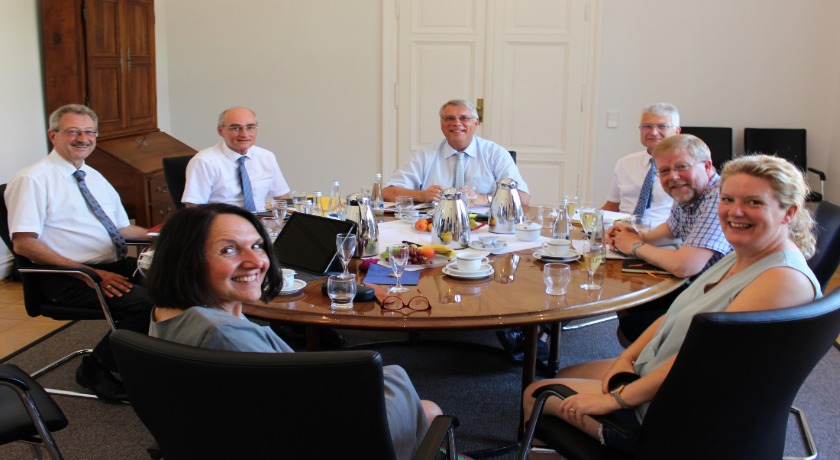 Returning from a three-month sabbatical, the Revd Philip Brooks, United Reformed Church (URC) Secretary for Ecumenical and Interfaith Relations, reflects on a recent trip to Germany.
Returning from a three-month sabbatical, the Revd Philip Brooks, United Reformed Church (URC) Secretary for Ecumenical and Interfaith Relations, reflects on a recent trip to Germany.
The trip took place ahead of the 30th anniversary of the fall of the Berlin Wall where 22 people from the URC will join in the four-day remembrance and celebrations, from 7-11 November, with the Evangelische Kirche der Pfalz (Protestant Churches of the Palatinate region of Germany).
There’s a common misconception in the UK that Germans don’t have a sense of humour.
My recent visit to the Haus Der Geschichte Bonn (House of History Bonn) exhibition, called ‘Very British – A German Point of View’, soon dispelled that myth. In a satirical way, the exhibition plots the history of Britain’s ambivalent relationship within Europe.
At the entrance there’s a Spitting Image style depiction of Theresa May holding a Brexit gun to her head, threatening to pull the trigger (the British Prime Minister may have changed but the symbolism hasn’t).
 While acknowledging the inevitable Brexit jibes, the exhibition depicts Germany’s deep sense of friendship and connectedness to the UK. That’s despite the populist caricatures of our German neighbours (shown by several cartoons in the museum), as always being the first to claim sunbeds on holiday.
While acknowledging the inevitable Brexit jibes, the exhibition depicts Germany’s deep sense of friendship and connectedness to the UK. That’s despite the populist caricatures of our German neighbours (shown by several cartoons in the museum), as always being the first to claim sunbeds on holiday.
There’s a sense of hope summed up by Monty Python’s song Always Look on the Bright Side of Life heard playing as visitors head for the exit. It’s clear the Germans love much of our culture. For instance, in Germany the most popular TV programme every New Year’s Eve is the 1960’s British comedy Dinner for One, about an increasingly inebriated butler who serves dinner to an eccentric, elderly lady in her stately home (played by English actors Freddie Frinton and Mary Warden).
I moved from Bonn to visit the URC partner churches in the beautiful, wine growing region of the Palatinate (known in Germany as the Pfalz) in the Rhein valley.
Part of my sabbatical visit was aimed at deepening relationships with the people and the churches in this part of Germany, a relationship that began with the Congregationalists in 1957.
My very first meeting at the Landeskirchenrat in Speyer (the regional equivalent to the URC’s Tavistock Place) was dominated by an hour-long session of questions from the senior leadership team who desperately tried to understand Brexit. As with most Germans I met, they had obviously been following every twist and turn in great detail.
We agreed, as churches which have been such good friends for over 60 years, that the relationship between the URC and the Evangelische Kirche der Pfalz is more important than ever. We committed to working even more closely.
In so doing, we will be living out one of the pledges written proudly on the wall of the exhibition: ”Very British shows that Brits and Germans – regardless of Brexit – will remain allies, partners and friends.”




